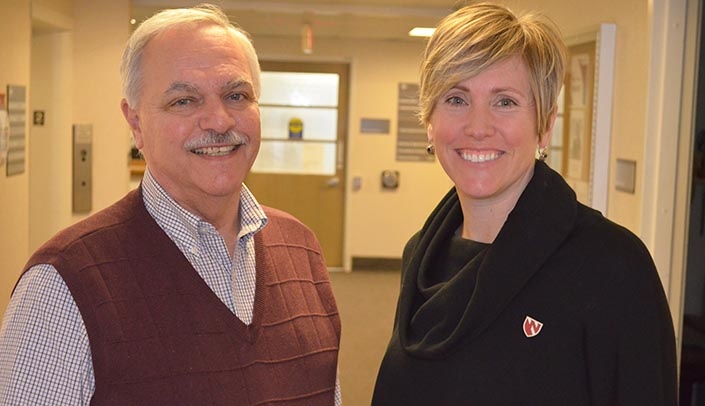To help children, you first have to reach them.
And one place to find them is in school.
The Behavioral Health Education Center of Nebraska (BHECN) was recently awarded a five-year, $3,725,000 grant from the Substance Abuse and Mental Health Services Administration (SAMHSA) to provide training and technical assistance to behavioral health providers in the four-state Region 7 area of the Midwest. In collaboration with the Munroe-Meyer Institute, BHECN also received a grant supplement for an additional $1 million through SAMHSA to expand mental health training efforts in schools.
“MMI is partnering with BHECN on this grant,” said Brandy Clarke, Ph.D., who with Joe Evans, Ph.D., project director, will oversee efforts to provide mental health training, consultation and technical assistance in schools to the four-state area of Nebraska, Iowa, Missouri and Kansas.
The team is wrapping up its first year, Dr. Clarke said, during which the focus was on making people aware of the program’s services: building comprehensive mental health programming in health clinics and schools, offering training and technical assistance, and creating a curriculum of core features needed to implement a mental health program within schools.
“We want to build it so that it’s systematic and at all levels, not just for those few kids who reach the highest level of need,” Dr. Clarke said. “It’s about creating prevention programs, implementing interventions within school systems from preschool to high school, and promoting mental wellness for all kids, not just those few who need extra help.”
The second year will focus on strategic planning and hands-on technical assistance.
The program is using the Multi-Tiered System of Support (MTSS) model, often described as a pyramid of care – and providing universal supports — “not just dealing with the child, but also with the teachers, the school system and the parents,” Dr. Evans said.
“About 80% of the kids’ needs are going to be met with a universal level of support,” Dr. Clarke said. “Up a level, you have about 15% of kids who are going to need a little extra support to be successful in the classroom — including social skills or therapy groups — mostly things that are handled in a group setting or in the classroom.
At the most intensive level, she said, services usually are individualized — as the intensity increases, the number of children needing that level decreases.
“So you maximize your benefits with what you do universally for all,” Dr. Clarke said.
The program also is an early access model, designed to identify and treat mental health issues before they become debilitating.
And schools are not just where the children are, Dr. Clarke said.
“School is actually one of the places that has the biggest impact on kids’ behavior and mental health. Schools have an impact. The teachers have an impact, peers have an impact, the system has a big impact on how kids are doing. So it’s important that it’s set up to have a positive influence.”
